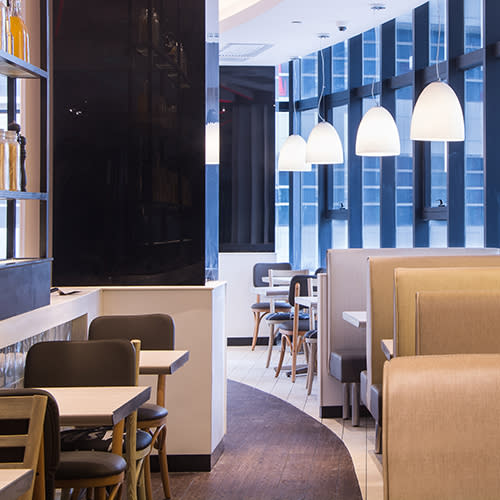Before You Sign: An Insurance Due Diligence Checklist for Oregon Hospitality Operators

Before You Sign: An Insurance Due Diligence Checklist for Oregon Hospitality Operators
Key checks to uncover hidden risks and ensure your new property is insurable—and affordable.
Thinking about expanding your restaurant, buying a new property, or leasing a space for your next venture? It’s an exciting time. But some hospitality operators skip a critical step: insurance due diligence. You need to look past curb appeal to understand the hidden risks of a property before signing on the dotted line. Is it insurable? And will you be able to afford the premiums? Here’s a brief list of issues to explore:
Start with a property deep dive
Put on an “underwriter’s hat.” An insurance company will look beyond the surface to assess the physical condition of the building, so you want to do the same.
- Inspect the building: Get a professional to evaluate the core systems. Check the age and state of the roof, plumbing, electrical systems, and HVAC. A history of water damage, mold, or pest infestations can signal ongoing problems and future claims.
- Verify code compliance: Ensure the property meets all current fire and safety codes. This includes checking for adequate fire exits, functional sprinkler systems, and properly maintained alarms. Non-compliance can lead to denied claims and costly mandatory upgrades.
- Analyze the construction type: The materials used to build the facility directly impact its risk profile. Buildings made of non-combustible materials like concrete and steel are much more appealing to insurers than wood-frame structures. If you are considering an older building, investigate for hazardous materials like asbestos or lead paint that require expensive remediation.
Consider Oregon-specific natural disaster risks
Oregon’s diverse landscape presents environmental risks that can affect your insurance costs and coverage availability. Don’t assume your property is safe; you need to verify its specific vulnerabilities.
- Know the geography: Coastal properties face flood risks, while many parts of Oregon are susceptible to wildfires. The Cascadia Subduction Zone poses an earthquake threat across the region.
- Review local hazard assessments: Use official resources like FEMA flood maps and local government data to understand the specific risks tied to the property’s parcel of land. Insurance underwriters will use this same information to determine your eligibility and premiums.
Study the surroundings
The neighborhood and its infrastructure play a role in your property's overall risk. A great location for foot traffic might also come with challenges that impact your insurance.
- Research crime rates: Look at local statistics for theft, robbery, and vandalism. A high-crime area may require you to invest in additional security measures like cameras, alarms, and lighting to get insurance coverage.
- Confirm proximity to emergency services: Check the distance to the nearest fire station, police station, and hospital. An underwriter will note the response time of these services. Properties located far from emergency support often face higher insurance premiums due to the increased risk of severe losses.
Conduct insurance-specific due diligence
Looking at the property through the lens of an underwriter helps you avoid surprises when you apply for insurance.
- Request the property's loss history: Ask the seller or landlord for a “loss run report.” This document details past insurance claims related to the property and can reveal recurring issues like plumbing leaks or security breaches.
- Verify zoning and permits: Confirm the property is zoned for your intended hospitality use. Also, ensure all necessary permits are in place for any special features, such as outdoor patios, fire pits, or structural additions. Operating without the right permits can invalidate your insurance coverage.
- Get an early insurance quote: Don't wait until the last minute. Contact your insurance provider for a quote based on the specific property. This will give you a clear picture of your potential premiums and any required endorsements, such as flood or earthquake coverage, which can significantly impact your cost structure.
- Check lender and landlord requirements: Your business loan and lease agreement may require certain insurance minimums. Make sure to factor these into your financial projections.
Prevent financial headaches
A thoughtful review protects your investment and prevents surprises that could disrupt your business—from unexpected insurance costs to claims that blow up your budget. It helps you make an informed decision, ensuring your new property is a foundation for growth, not a source of unexpected risk.
Also, your due diligence allows you to craft a thorough and compelling narrative for prospective insurance companies. Underwriters appreciate detail-oriented businesses that understand and actively manage risks.
Did you know? Your ORLA membership includes a complimentary annual insurance review. If you haven’t scheduled yours this year, reach out today to get started: https://www.risk-strategies.com/hospitality-insurance-program.
About the author:
Rob Hoover of Risk Strategies, part of the Brown & Brown team, manages ORLA’s Hospitality Insurance Program (HIP). At 15, Rob started as a potato peeler in a small, family-owned diner. Today, he’s an industry insider with deep knowledge of day-to-day hospitality challenges. For the past 20 years, he’s helped hospitality businesses as a risk management and insurance advisor.
